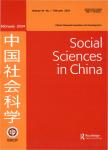SPECIAL ISSUE: MIGRANT WORKESR IN THE COURSE OF URBANIZATION Factors influencing the migration intentions of rural workers in the Pearl River Delta
SPECIAL ISSUE: MIGRANT WORKESR IN THE COURSE OF URBANIZATION Factors influencing the migration intentions of rural workers in the Pearl River Delta作者机构:Department of Sociology and Social Work Sun Yat-sen University
出 版 物:《Social Sciences in China》 (中国社会科学(英文版))
年 卷 期:2008年第29卷第3期
页 面:157-171页
学科分类:120301[管理学-农业经济管理] 12[管理学] 1203[管理学-农林经济管理]
基 金:The main ideas of this article were presented under the title of "Research on the Permanent Migration Intentions of Migrant Workers" (农民工永久性迁移意愿研究)published in Sociological Research" (社会学研究) no. 6 2007. This research was co-sponsored by 2005 National Fund for Philosophy and Social Sciences (05&ZD034) and the Sun Yat-sen University Social Sciences Innovation Center on Public Administration and Social Development as a part of the national 985 project
主 题:migration intentions institutional migration behavioral migration individual motivations for migration pressure of institutional legitimacy
摘 要:The focus of this article is this question: under China's present household registration system, what factors influence migrant workers' decisions to obtain urban household registration in order to stay permanently in the city? Our research finds that if willingness to give up their land is used as the indicator for behavioral permanent migration, the main factors that influence migrant workers' intention to migrate will be their individual motives for migration, i.e. choices based on economic rationality. If wishing to transfer their household registration to the cities where they work is used as the indicator for institutional permanent migration, the main factors that influence their intentions will be regional conditions and the pressure of institutional legitimacy, and their choices will be socially rational in that they are seeking institutional protection to improve their life in the city. Groups with different aspirations vary in their individual motivations for migration and the degree to which they feel the pressure of institutional legitimacy.



